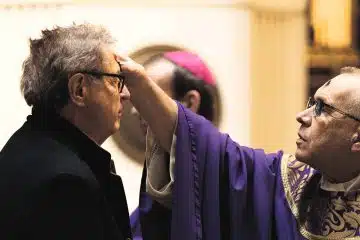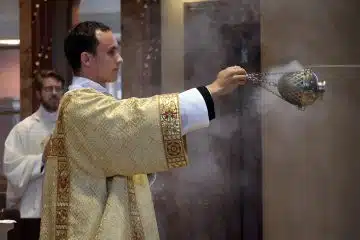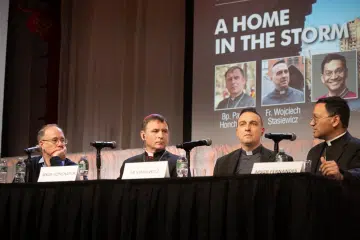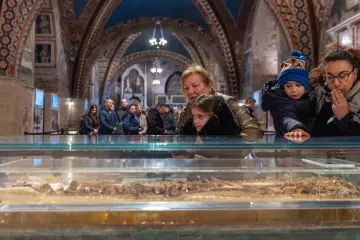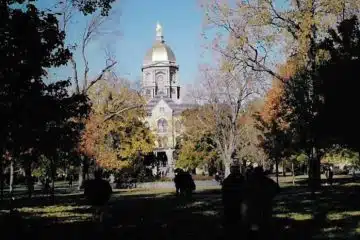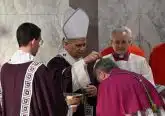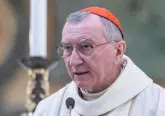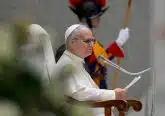Telegram Home from Rome

When the Protodeacon, Cardinal Mamberti, announced the new pope’s name, I lost it: Viva il papa! Papa Leone! The crowd went crazy. It was electric. It was better than any football game, election, or other entertainment. The Church does drama so well because she deals in eternal realities. The pope is the Vicar of Christ, entrusted with the weight of universal pastoral governance of the Kingdom that will never fail.
I was especially filled with joy because of my study of the Church Fathers and my love for Pope St. Leo the Great, “The Savior of the West,” who personally stopped Attila the Hun from destroying Rome in 452. On the anniversary of his own elevation to the papacy, St. Leo explained that the pope is merely the humble steward of Peter’s continual work: “Therefore the constitution of Truth abides, and persevering in the fortitude he has received, Peter does not abandon the governance of the Church he has undertaken” (Sermon 3). And Peter himself is a mere vessel. Elsewhere, Pope St. Leo said that Jesus “wished His gifts to flow into the whole body from [Peter] like from a head” (Letter 10).
It was an incredible grace to experience this divine instrumentality as St. Peter’s successor, Pope Leo XIV, spoke to us the words of the risen Christ: “Peace be with you all!” From the Father, in the risen Christ, and through his steward the pope, we received the gift of peace.
My patristic joy did not end there. As Pope Leo continued, he declared himself a “son of Augustine,” then quoted that great doctor of the Church: “With you I am a Christian, and for you I am a bishop.” That quote is taken from a sermon given by Augustine on the anniversary of his ordination as bishop (Sermon 340), where he explains the unity of believers in their common baptismal priesthood and the high task that a bishop has been called to in his distinct office. Just before the quote, Augustine explains that if Jesus doesn’t carry the burden of the bishop, “We collapse.” But Augustine also humbly confesses that it is the task of the people to support their bishop: “You also hold me up.” We support the Holy Father with our daily prayers, but also by taking up our share of responsibility allotted to us in the vineyard.
Pope Leo XIV’s motto is another quote from Augustine, and it explains our mission beautifully: in illo Uno unum—in the One, we are one. It is taken from Augustine’s commentary on Psalm 127. This phrase is not some vague wish for unity but the concrete promise of Christ who broke down all false division in His blood. Augustine explains, “There are many Christians, but Christ is one. The Christians themselves with their Head, who ascended into heaven, is one Christ.”
Pope Leo has been called to the office of unity for the Church, and we have been called into that unity. We must support our Holy Father by personally living our communion with Christ and His Church and by inviting others into the fullness of this communion in a world starved for unity.
Another word for this unity is charity. As Pope Leo XIV acknowledged at the end of his first homily as pope, St. Ignatius of Antioch declared (in AD 107) that the Church in Rome holds “the primacy of love.” This love has a price, though, and the price is sacrifice. St. Ignatius paid for it with his own blood as he was ground into wheat “by the teeth of wild beasts.” He wished to become “the pure bread of Christ.”
Pope Leo explained this passage beautifully: those who have been given authority are called “to move aside so that Christ may remain, to make oneself small so that He may be known and glorified (cf. Jn 3:30), to spend oneself to the utmost so that all may have the opportunity to know and love Him.”
May our Holy Father, the lion, protect us from all enemies of truth, unity, and love. May he lead us to the One from whom all fatherhood in heaven and on earth is named.
 Fr. Jacob Lindle, ordained a priest of the Archdiocese of Cincinnati in May 2022, is presently studying for a Doctorate in Patristic Theology at the Pontifical Gregorian University in Rome.
Fr. Jacob Lindle, ordained a priest of the Archdiocese of Cincinnati in May 2022, is presently studying for a Doctorate in Patristic Theology at the Pontifical Gregorian University in Rome.
This article appeared in the July 2025 edition of The Catholic Telegraph Magazine. For your complimentary subscription, click here.



